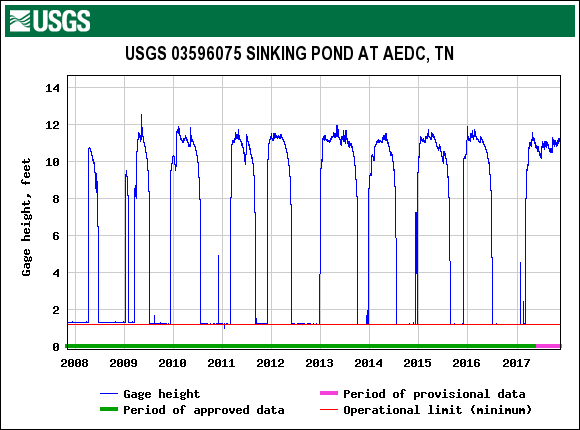
Regeneration Failure in Overcup Oak in a Seasonally Flooded Karst Depression
Sinking Pond, a 35-hectare, seasonally flooded karst depression located on Arnold Air Force Base near Manchester, Tennessee has been recognized as a National Natural Landmark for its unique biodiversity. This forested wetland is dominated by a disjunct population of overcup oak (Quercus lyrata) that our research has shown to be exhibiting spatially restricted patterns of regeneration. Since 1970, recruitment of seedlings to small adult size classes has been entirely limited to shallow (less than 0.5 meters) ponding depths. Hydrologic models characterize ponding durations after 1970 as being considerably longer than historical norms, pointing to climate change as the likely factor driving the suppression of tree regeneration in the Pond.


Our recently published study found that current patterns of tree recruitment and mortality within this forested wetland indicate that it is progressively transitioning towards a more open-pond condition. The paper in the journal: Forest Ecology and Management involved collaboration with hydrologists at the US Geological Survey and former student Sarah McCarthy-Neumann C’99 who recently joined the faculty at TN State University. Angus Pritchard C’22, Herbarium Block Fellow, was also a co-author. The study represents one of the first examples of a climate driven state change occurring with an inland ecosystem of the southeastern United States.

Publications:
-
Evans, J., *S. McCarthy- Neumann, *A. Pritchard, J. Cartwright, B. Wolfe. 2022. A forested wetland at a climate-induced tipping-point: 17-year demographic evidence of widespread tree recruitment failure. Forest Ecology and Management 517:120247.
-
Wolfe, W., J.P. Evans, * S. McCarthy, W.S. Gain, and B. Bryan. 2004. Tree-regeneration and mortality patterns and hydrologic change in a forested karst wetland – Sinking Pond, Arnold Air Force Base, TN. U.S. Geological Survey Water-Resources Investigations Report 03-4217. (Agency peer-reviewed)
-
* McCarthy, S. and J.P. Evans. 2000. Population dynamics of overcup oak (Quercus lyrata) in a seasonally flooded karst depression. Journal of the Torrey Botanical Society 127:9-18.









